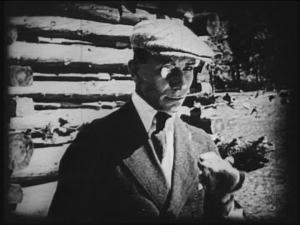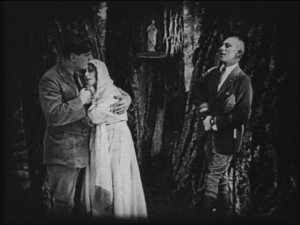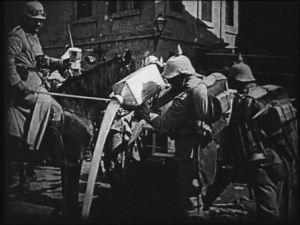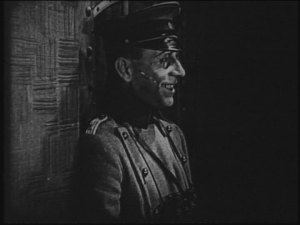This is the story of five brothers and the woman they… Oh, who am I kidding? There is only one reason people watch this movie and it can be summed up in this little list: Erich von Stroheim + tall window + baby. You do the math. This propaganda rip-off was a smash hit when first released and may or may not have been what launched von Stroheim’s career as a director.
Imitation is the sincerest form of flattery? Are you sure?
It was 1918 and D.W. Griffith was feeling just a little smug. His government-sanctioned propaganda picture, Hearts of the World, had made a handsome profit and had even inspired its own imitators. In fact, Griffith’s smugness can be attributed to one of these imitators.
 The Heart of Humanity was produced by Carl Laemmle’s Universal Pictures, always a bit of an upstart in the major motion picture studio brigade. For the production, Laemmle had stolen Griffith’s second male lead, Robert Anderson, and the film’s leading lady, Dorothy Phillips, flagrantly copied Lillian Gish’s mannerisms.
The Heart of Humanity was produced by Carl Laemmle’s Universal Pictures, always a bit of an upstart in the major motion picture studio brigade. For the production, Laemmle had stolen Griffith’s second male lead, Robert Anderson, and the film’s leading lady, Dorothy Phillips, flagrantly copied Lillian Gish’s mannerisms.
Griffith was so sure that the movie would fail that he made a little bet with Sol Lesser, a successful movie producer. Griffith staked $100 that The Heart of Humanity would not gross more than $7,000.
Griffith lost that bet. The Heart of Humanity was a smash hit. Of course, war fever was at its height and propaganda pictures were hot at the box office but I think we can attribute much of the film’s success to one secret weapon: Erich von Stroheim.

Our friend von Stroheim had worked for Griffith as an assistant and had served as a technical consultant on the set of Hearts of the World, as well as playing a villainous German officer. However, he had been passed over for promotion, by which I mean he was not allowed to direct a Fine Arts-Triangle programmer. Film historian William K. Everson theorized that von Stroheim and Carl Laemmle may have made a deal.
In a nutshell: Erich von Stroheim was not given an opportunity to direct and was languishing in the ranks. Either Laemmle made him an offer or von Stroheim approached Laemmle with a plan. He would help make The Heart of Humanity as Griffith-like as possible. He knew all the tricks by then and, in exchange, Laemmle would allow him to make Blind Husbands, which was released just ten months later.

There is no smoking gun for this theory but the timing does match and, further, we must remember that the Griffith stable was a cutthroat place to work. Griffith actively encouraged his actors, actresses (particularly his actresses, he had a thing), cameramen and assistants to fight one another tooth and nail for a limited number of positions. He enjoyed watching their spats (again, especially the actresses because, you know, thing) and thought the whole battle was great fun.
(I should also point out that the Griffith club was not the only stress-filled workplace in town. He did not, to my knowledge, release lions on his cast, nor did he allow his performers to be kicked to death by ostriches.)

According to Von: The Life and Films of Erich von Stroheim, von Stroheim was viewed as an alien presence and excluded from Griffith’s inner circle. Can you blame him for jumping ship? Erich von Stroheim always spoke highly of Griffith but it was in the best interest of his career to do so. Erich was nothing if not pragmatic in his myth-building.
I must emphasize that Everson stated he had no evidence and was merely speculating. In Stroheim, Arthur Lennig states that The Heart of Humanity was a one-off for von Stroheim and he had to haunt the producer’s office for days in order to secure the audience with Laemmle that resulted in Blind Husbands. (If you put credence in the Everson theory, you have only to believe that the meeting took place before The Heart of Humanity was made, not after.)

Whether or not von Stroheim and Laemmle made a bargain (and I am inclined to think that they did), The Heart of Humanity was clearly an audition of sorts for our would-be director. It would prove to be a memorable one.
My copy of the film runs about 110 minutes. The simple fact, though, is that 100 of those minutes are almost completely forgotten. The remaining 10 minutes? We’ll get to those is a bit but first, here is the very basic plot.
(The copycat elements are too tedious to enumerate and so I shall confine myself to the more interesting examples.)

The story opens in Canada and concerns the Patricia family, which consists of the widowed mother (Margaret Mann) and her five sons. All of the sons love their mother. Really, really love their mother. Really, really, really…
It’s disturbing, okay? I always get annoyed when people take silent era kisses on the mouth the wrong way (it was considered quite suitable for close relatives to do so and did not carry sexual meaning in that context) but this family is just a bit too warm.

The Patricia boys are all in love with Nanette (Dorothy Phillips), the American niece of the local priest. If five grown mama’s-boy sons simultaneously chasing one woman sounds weird, it is. Fortunately, Nanette is not very bright. She likes squirrels and shiny buttons. And John (William Stowell), the oldest of the Patricia boys. John has arrived home accompanied by a pal, one Eric von Eberhard (Erich von Stroheim).
(WWI propaganda films seemed to often feature pre-war Germans visiting Allied nations– only to be exposed as vicious brutes once the war starts. I should also note that Hollywood films of this period had a nastiness and an embrace of graphic and extravagant violence that remains shocking even to modern viewers. You will soon see what I mean. In fact, some filmmakers were more than a little ashamed of themselves once the war ended.)

The Heart of Humanity uses every coarse trick in the book to establish its heroes and villains. Erich von Stroheim’s character was specifically designed to offend as many contemporary secular and religious sensibilities as possible. In quick time, he shown to be a lusty, lewd atheist (apparently, no one remembered that German soldiers regularly had “Gott mit uns” inscribed on their equipment and uniforms) who openly praises dictatorship and would doubtlessly have started kicking puppies if he had managed to locate any.
To be honest, by the time he showed up, I wanted to kiss von Stroheim. The movie had been so dull, so full of clichés and rip-offs that I was ready to scream. It’s like Allen Holubar (credited director and husband of Dorothy Phillips) took all the Griffith tropes and quadrupled the recipe. That annoying tendency for Griffith heroines to shriek and spin upon seeing a bunny? Clearly, we need a lot more of that. Filial affection expressed through just a few kisses too many? Well, let’s make the audience really uncomfortable.

Erich von Stroheim did not have many scenes but he made the most of what he had. Eric von Eberhard immediately begins to pursue Nanette. She recognizes him for the filthy Hun that he is and will have none of him but John remains oblivious. During one of these scenes, we are shown a spider crawling across a Virgin Mary statuette. Everson suggests that this scene has the von Stroheim touch and, given that it is so much more audacious and baroque than the rather trite images shown previously, I must again agree with Mr. Everson.

(Holubar’s work is not widely available, with good reason if this picture is anything to go by. What I noticed with this film was that any scene that has von Stroheim in it shows a noticeable uptick in quality. Given that von Stroheim was always free with his suggestions if not downright bossy, I think it likely that he managed to wrest the megaphone from Holubar whenever he appeared.)
The hackneyed storytelling soaks into the very bones of the film. Nothing is left to chance. Hints? Why bother with those when you can bash your audience over the head. I got particularly tired of the oh-boy-are-we-Canadian tropes. Unlike, say, Back to God’s Country, which is proudly Canadian but manages to convey the fact in numerous and interesting ways, The Heart of Humanity just keeps showing us trees and canoes and men in furry hats.

This is not real Canada, you see, this is Movie Canada. Movie Paris is full of people in berets who live in have shabby chic apartments with a view of the Eiffel Tower. Movie Tokyo? Be careful, there are ninjas lurking! And Movie Canada? No cities, only forests. The fur-hatted, flannel-wearing men spend their days chopping at trees, the women are all squirrel fanatics named Nanette and the mail is delivered by Mountie. (My state is not immune either. A shocking number of people think that California is all palm trees and that we regularly rub elbows with movie stars.)

Don’t think that just Canada gets The Heart of Humanity treatment, though. Oh no. We are treated to ignorant views about the Americans, the Germans and there is even a dig at Italians and their garlic-eating ways.
My point is that the movie gets weighed down by its own clichés and starts to drag. But I have been going on for far too long. Back to the story. Yes, I’m afraid we must.


Of course, World War One begins on the very day of John and Nanette’s wedding. The wicked von Eberhard returns to Germany and the Patricia boys join the army. It then turns into a countdown as the Patricia boys are picked off one by one. All the deaths are treated as a glorious events, each of the brothers giving their lives for the Great Cause. (Whatever that is supposed to be. The First World War was a conflict that managed to harm just about everyone involved.) Meanwhile, the Germans busy themselves pouring milk into a gutter before the eyes of starving war orphans. Lest we forget who the bad guys are.

Before long, there are only two Patricia boys left in the ranks. John is one and the other is played by Robert Anderson, who was Monsieur Cuckoo in Hearts of the World. Anderson plays the most annoying of the brothers by far. He mugs shamelessly, puts bread in his trousers, spanks German POWs (?) and is a bit too excited about chickens. I got unholy glee out of Erich von Stroheim shooting him and then treading on the corpse. (You see what this movie brings out in me?)

Meanwhile, Nanette is expecting. How can we tell? She knits tiny socks and then kisses them. And kisses them. And kisses them. She kisses them in a manner usually reserved for Rudolph Valentino. Pregnant ladies, do you actually do this? Please tell me you don’t. It could get dangerous. Anyway, as the war drags on, she decides to join the Red Cross to take care of the aforementioned war orphans. (There are also some Nanette-as-a-saint images that I am pretty sure were cribbed from Joan the Woman.)

So, the setup is as follows: A French (or possibly Belgian, I wasn’t paying attention) town is being shelled. Nanette is evacuating war orphans and doing a rather poor job of it as she misses a few and has to go back. Our villainous von Eberhard spots her and determines to do his worst. Meanwhile, John is racing to the rescue.
And now we have arrived at That Scene. Those of you in the know will be nodding sagely. Those of you who have no idea what I am talking about, gather round and I shall explain. Some stars are made gradually and some arrive with a dramatic flourish. For example, Ramon Novarro became a star the moment he tossed his monocle in The Prisoner of Zenda. Well, Erich von Stroheim went from generic baddie to the Man You Love to Hate when he tossed… a baby out an upper-floor window. Yes. A baby.

This scene is infamous and is often used as an example of the over-the-top propaganda of the First World War. It is almost certain that von Stroheim directed the scene himself. Once again, it is simply too flamboyant for the trite imagination of Allen Holubar. Von Stroheim tears at Nanette’s uniform with his teeth, drags a screaming baby out of her arms and makes the infamous decision casually throw it out the window. I am not making this up. It is one of those scenes you watch and then wonder if your eyes were playing tricks on you. It’s just so over-the-top horrible.

(Erich von Stroheim brilliantly lampshaded his lusty Hun character in Five Graves to Cairo. Ann Baxter offers him her… gratitude in exchange for releasing her brother. He responds by saying that she is too melodramatic and, besides, she is doing it all wrong. If she wants her brother released, she must fill out the proper forms.)

Dorothy Phillips concludes the scene by ripping off Lillian Gish’s nervous breakdown from Hearts of the World. The villainous von Stroheim is dispatched and it all ends with Nanette distributing war orphans like party favors to the citizens of Canada. Yes, really. She just starts passing them out. Since the war was still going on when this movie was made—it premiered just one month after the armistice—the ending is a bit ambiguous. Some claptrap about “our women” or some such nonsense. I stopped caring quite some time ago. (A tip: If you want to honor women, start by not referring to us as “our women.” It makes us feel like dishes or furniture or some other possession.)

Ugh. The performances are awful, the characters are badly written, the story is stupid, the propaganda is coarse, the stereotypes are vulgar… This is a very bad movie. And yet…
Hearts of the World is generally seen as one of the better of the lesser Griffiths, if you like Griffith, greater or lesser. The Heart of Humanity is… Well, I wouldn’t really describe it as good, not in the accepted sense anyway. It’s audacious, that’s for sure. To be honest, I find something appealing about Laemmle and von Stroheim’s sheer gutsiness in attempting this and pulling it off on any level. A fabulous display of what the Welsh side of my family calls chutzpah.

There is a quote from Lawrence of Arabia that I think fits D.W. Griffith’s loopy on-again, off-again brand of pacifism.
“With Major Lawrence, mercy is a passion. With me, it is merely good manners. You may judge which motive is the more reliable.”
Or, in this case:
“With D.W. Griffith, war filmmaking is a passion. With me, it is merely good business. You may judge much motive is the more entertaining.”

I think we all know the answer. Erich von Stroheim wins this round, at least in my book. The Heart of Humanity is a terrible movie that is worth seeing for its shock value. It’s worth seeing for its schlock value. It’s definitely worth seeing for even casual von Stroheim fans.
Movies Silently’s Score: ★½
Where can I see it?
The Heart of Humanity has been released on DVD by Grapevine.

The background machinations are fascinating. Your description of the movie had my jaw dropping. Your writing delights.
Thanks so much! Yes, the backstory is extremely juicy on this one.
This looks hilarious and a lot more entertaining than the insincere solemnity of Hearts of the World.
It does have its moments, definitely. Hearts of the World mainly had Dorothy Gish going for it, I’m afraid.
I remember when I first saw That Scene in a documentary. The look on my face was exactly like that screenshot. This is a big reason why I soon learned to respect silent films and never assume that Old = Gentle And Cautious.
Yes, especially the WWI propaganda flicks. Those will knock your socks off.
Hi Fritzi. The review was as enjoyable as the movie is… whatever the the movie is. I liked this line in particular: “Hints? Why bother with those when you can bash your audience over the head.” Thanks for sharing your thoughts and wit with us all.
Thanks so much! This film is definitely… well, it’s a film, that’s for sure. 😉
Your review is undoubtedly better than this movie! I enjoyed the stills you posted-I guess we’re also to assume Canadians don’t know how to dress from the pic of a young man in a striped shirt with a polka-dotted tie?? Plot question for you. The leading lady, is she expecting a baby when she joins the Red Cross? Why would the Red Cross, in WWI days, let a pregnant woman join? Did she keep it quiet? Is it her baby Stroheim’s character throws out the window?
So glad you enjoyed the review!
To answer your questions:
The heroine gets the idea to join the Red Cross while pregnant but her child is a toddler when she actually signs on (the movie takes place over a span of years, though the passage of time is not handled very well.) She leaves her son with his grandmother before she departs for Europe. The baby that gets thrown out the window by Erich von Stroheim was not her child. It was one of the orphans she was trying to evacuate.
Hope this clarifies everything! 🙂
Just as an aside: I read somewhere that American soldiers thought it was funny to write on their own equipment, “We got mittens, too.”
I haven’t seen this one yet, but I plan too, and I’ll be sure to come back and re-read once I have.
Well, they weren’t wrong 😉
This movie seems awful, yet your hilarious review has me thoroughly intrigued.
Thank you! It is dreadful but you will never see anything like it.
Great review Fritzi! Forgoing plot in favour of spectacle certainly seems to be a theme of WWI movies.
I’ve recently become a von Stroheim convert, so I’m looking forward to seeing this one… I’ll come back and re-read once I have!
Thank you! At the very least, von Stroheim seems to be having a wonderful time.
Epically hilarious! I am sure your review exceeds the film in entertainment value. I don’t know what else to say except thanks for an awesome and delightful review (oh yeah – and thanks for hosting!)
My pleasure!
Yes, this movie is not for the faint of heart. Yikes!
As there are many great silent movies I still haven’t seen, I won’t be rushing to see this one, but your review is very interesting – and I’m not surprised that von Stroheim’s scenes are the best ones. For a great director, he was quite an actor too!
Yes, he is splendidly horrid in this.
Well, this review came in handy. I know someone obsessed with squirrels, so I swiped your GIF and sent it her way. She’ll probably poke around here and read that review and maybe ask if I have this horrible film. I do not, but I may have to see it anyway. Um, thanks?
As for “that scene”… wow. I laughed out loud reading that part because the last time I came across that it was in a old indie comic and used as a rather bizarre lesson: http://momentofcerebus.blogspot.com/2013/07/throwing-babies.html
Yes, the film is a veritable treasure trove for squirrel fanatics 😉
What a fun and funny review, Fritzi! Such sarcasm! And that ‘throwing the baby’ scene is something else; who knows, maybe there were some lost frames where the bathwater went first!
Thank you! And, who knows, with von Stroheim, anything is possible! 😉
You had me at “schlock”!
Every time I read one of your fabulous reviews, I go in search of the film and sometimes also the actors and directors unless I already know them well. I am missing work and losing sleep. When I lose my clients and am living in a refrigerator box, I will blame you entirely.
Yours with love,
Janet
Aww, thanks so much!
Ha ha! This is a fantastic review. I will never watch this movie, but I had a great time reading your analysis of it. Throwing babies out windows and pouring out milk in front of starving orphans is a bit much, even for villains in terrible movies. I think I would have been cheering for Erich, too, given the circumstances.
I don’t heartily recommend watching it in any case. Those WWI propaganda films can be so nasty! At least we have Erich. 😉
I had a blast reading this, you are such a good writer 🙂 love the background knowledge, goodness and with such figure there’s is background, and the humour you brought to it. anyway this flannel clad Canadian’s gotta go, trees won’t chop themselves ya know
Thanks so much! And the squirrels, you must not forget the squirrels! (Is your name secretly Nanette?) 😉
I tried to find this film, but only found the 1932 version in Brazilian land… which shows that even horrible movies can be remade. But I didn’t give up: I still want to see Stroheim tossing a baby out of the window. And I totally believe he and Laemmle made a deal.
Thanks for co-hosting this blogathon! Now I know more about WWI planes than I ever wished.
Kisses!
Thanks so much! Yes, this is a fairly difficult one to track down. How interesting that it was remade with a Brazilian setting.